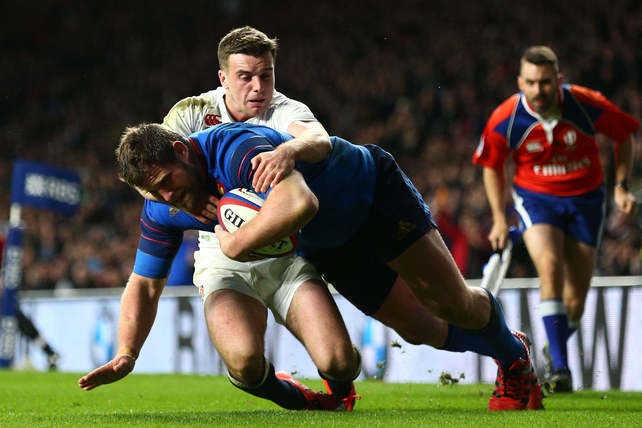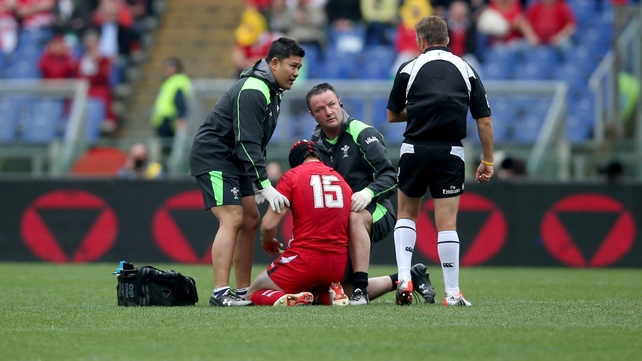It was a day that the championship needed and one that will not be forgotten for a long, long time. Three sensational matches. Six-and-a-half hours of glorious drama. 27 tries.
The rollercoaster began in Rome, picking up pace in the second half until Wales had scored 61 points. Warren Gatland’s men must have felt they had done enough by the time the final whistle had blown.
At Murrayfield, the vibe was downbeat and there was no real sense that a title bid was on the cards. But Ireland took up the challenge and with a combination of a purposeful breakdown and ambitious attack, gradually built a score against a willing but limited Scotland.
They had Luke Fitzgerald to thank for giving them a jump-start early in the game. If any Irish player doubted in that early part of the game, they had only to look to the on the left wing to know that at least one of player in green believed Ireland were capable of getting the job done.
Scotland’s attitude has been questioned but Stuart Hogg’s scything cut over the Irish line was testament to their commitment late in the game. It needed everything Jamie Heaslip could muster to prevent a second Scottish try. Ireland made hay in a situation where a week previously, England had been unable to turn even greater opportunity into points.
Like Ireland, England were energised by the challenge of chasing. France also responded, playing a huge part in an absolutely magical evening in London.
France played their part

Noa Nakaitaci’s near-miss. Vincent Debaty out-running everyone to pop up and score in the corner. Rory Kockott’s celebration at the end. Yoann Huget playing on after time was up. Sublime, ridiculous, marvellously French. Agonising if you were Irish or English.
Rugby nirvana for everyone else.
Where does it leave the game and what can be learned from this championship?
It should be remembered that while the buzz from the final day is strong, the preceding four rounds were much less successful as a whole. There was a sense that zero-sum tactics were leading rugby union down a dead-end.
Looking ahead to the Rugby World Cup, France and England may take more from the last day than anyone else. Twickenham looked like a true meeting of heavyweights. It was also a match where the interplay between the ruck contest, penalties, risk-taking in attack and defence, and the kicking game was near perfect.
The try must be the focal point
Both teams went hell-for-leather in pursuit of tries from the off and that may be the most important fact of all. The final day happened under the points difference system but those who favour the introduction of the bonus point had their argument boosted. The scoring system itself may also need attention. Should a try be worth five, a penalty or drop-goal three and a conversion two?
A careful balance is still needed, and the award of a penalty must remain a serious disincentive to illegal play at the breakdown. But territory and entry into the 'red zone' are now so valuable that even a downgraded penalty that is kicked to the corner rather than over the posts might be punishment enough.
What else?
Alongside striving create the conditions for more free-flowing rugby, the game has other more serious issues to resolve.
Even on the final day, incidents like Leigh Halfpenny’s concussion and Courtney Lawes’ tackle on Jules Plisson were a timely reminder of the risks rugby players take every time they take the field. Lawes' tackle was judged legal but was still seriously concerning.
Is it time for rugby to follow in the footsteps of other sports and oblige players not to endanger the safety of their opponents regardless of whether it falls within the rules or not?
American football and soccer have taken steps to remove reckless play from the game. Soccer has banned even the successfully executed two-footed tackle. American football does not allow tacklers to use excessive force on defenceless receivers. Both emphasise the need for players to retain control and not create risky situations.
Skilled players like Plisson need to be able to take risks. They need more protection.
Players must also protect themselves
The issue of players protecting themselves also needs attention. Tacklers must play with greater regard for their own safety and should be sanctioned more often when they don't. Use of unsafe technique should be noted and offenders warned and ultimately suspended.

Anything that can be done to bring more tackles down around the hips or ankles and with the head on the correct side must be looked at.
A high-powered committee will to look at ways to improve the game after the Rugby World Cup. The lesson from the first four rounds of the championship is that all this and more must be on the table.
What about the positives? We are often told that rugby is about winning collisions. That has its place but the lesson of Saturday is that the game is at its best when it fluid and dynamic, with the try as the focal point of the game.
Perhaps it is inevitable that at the end of what was a life-affirming day of sport, the question is: “why can’t it be like this all the time?”
Or at least a bit more often.






